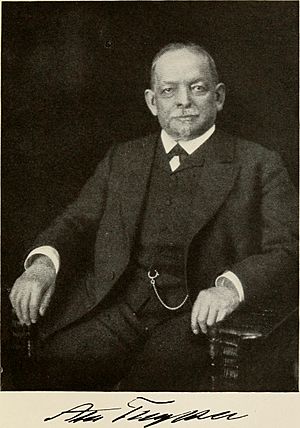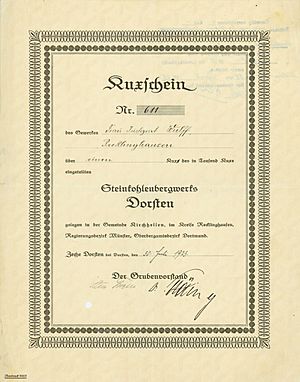August Thyssen facts for kids
August Thyssen (born in Eschweiler, Germany, on May 17, 1842 – died at Landsberg Castle, Ratingen, on April 4, 1926) was a powerful German industrialist. He built a huge business empire focused on iron and steel. His companies later became a big part of ThyssenKrupp AG, one of the world's largest industrial groups today. Thyssen was known for his hard work and simple lifestyle, even though he was one of the richest people in Germany.
Contents
Building an Industrial Empire
After finishing his studies at universities in Aachen and Karlsruhe, and a business school in Antwerp, August Thyssen joined his father's bank. This experience helped him understand how businesses work.
In 1867, August Thyssen and his family started an iron works company called "Thyssen-Foussol & Co" in Duisburg. A few years later, in 1870, he used the money from that company to create "Walzwerk Thyssen & Co" with his father. This new company became the foundation of his massive industrial empire in Mülheim an der Ruhr. At that time, the prices for iron and steel were very high, which helped him make a lot of money.
August Thyssen was very smart about how he ran his businesses. At first, he managed each company separately. But eventually, he brought them all together under one main company, known as a holding company. This allowed him to control everything more easily. One of his biggest achievements was buying the "Gewerkschaft Deutscher Kaiser" coal mine in Hamborn in 1891. This mine was very important because coal was needed to make steel.
He was also a pioneer in technology. He built the first 500-ton blast furnace in Germany, which is a huge oven used to make iron. He also built the first 100-ton Martin furnace for making steel, and the first large factory for making pipes. Thyssen also helped start RWE, a major energy company.
Family Life and Business Control
On December 3, 1872, August Thyssen married Hedwig Pelzer in Mülheim an der Ruhr. They had four children: Fritz, August, Heinrich, and Hedwig. They later divorced in 1885. To make sure his business empire would stay together and not be divided because of the divorce, Thyssen gave ownership of his companies to his children. However, he kept the right to manage everything himself for the rest of his life.
The group of companies built by Thyssen became the core of Vereinigte Stahlwerke AG, which was the largest mining and steel group in the world before World War II. After the war, the Thyssen company was re-established in 1953. Later, in 1997, it joined with another big company, KruppHoesch, to form ThyssenKrupp AG, which is still a very important industrial company today.
August Thyssen also bought a lot of land, including most of Beeckerwerth and Haus Knipp, in the early 1900s. He was the first in his family to start collecting works of art. He even owned six pieces by his friend, the famous sculptor Auguste Rodin.
Business Philosophy and Legacy
Thyssen's companies were "vertically integrated." This means he controlled every step of the steelmaking process. For example, he owned his own ships to transport materials, his own docks, and even his own railroad. This helped him make sure his factories always had what they needed and could deliver products efficiently.
Even though he was incredibly rich, August Thyssen lived a very simple life. He believed, "If I rest, I rust," meaning he always wanted to be working and improving. He ran his huge empire from a small, plain office. He drove an old car, wore regular clothes, and was known to eat and drink with his workers. He was also a strong supporter of a republican form of government, which means he believed in a government where citizens elect their leaders.
During World War I, in the winter of 1916-1917, August Thyssen stayed in Switzerland. There were rumors that he was unhappy with how Germany was handling the war. A document, which became very famous, was circulated in neutral countries and later in England and the United States. This document contained serious accusations against the German government and the Kaiser (the German emperor). It claimed that the Kaiser had asked big businesses for financial support for the war in 1912, promising them more business opportunities after the war. However, the war lasted much longer than expected, and the promised opportunities didn't happen.
The document said that Thyssen refused to contribute to a new loan for the war, and because of this, his contracts with the government were canceled, and his company was put under state control. When he returned to Germany in 1917, he never said if the document was true or not. He continued to live a quiet life, and his son Fritz soon took over the management of the business. The company managed to survive the end of the war and the difficult times that followed.
August Thyssen passed away in 1926 from pneumonia after having eye surgery.
Children
August Thyssen's children were:
- Friedrich "Fritz" Thyssen (1873–1951), who also became a very important industrialist.
- August Thyssen (1874–1943), who never married and had no children.
- Heinrich Freiherr Thyssen-Bornemisza de Kászon et Impérfalva (1875–1947), another industrialist and a famous art collector.
- Hedwig Thyssen (1878–1950), who married twice and had a son named Joseph Thyssen.
See also
 In Spanish: August Thyssen para niños
In Spanish: August Thyssen para niños
- Thyssen AG, a steel company
- Thyssen family
Images for kids
 | Anna J. Cooper |
 | Mary McLeod Bethune |
 | Lillie Mae Bradford |





